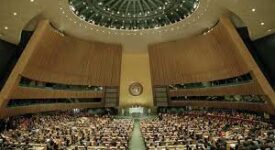The dramatic shrinking of Lake Chad has exerted an enormous effect on the wider Sahel region. For Europe, environmental degradation has long been exacerbating conflict and migration in the Sahel region, often with direct implications for European shores. Environmental stresses act as ‘multipliers’, aggravating social, economic, and political drivers of instability. They do so by precipitating food or water insecurity, reducing the arable land available for agriculture, and increasing tension around scarce resources.
In the past, policymakers have mostly addressed the various environmental challenges in the Sahel from a developmental perspective. This remains true today. For example, back in February, the Sahel Alliance presented the ‘G5 Sahel’ with plans to invest €6 billion in development funds between 2018 and 2022. On the one side, the Sahel Alliance comprises France, Germany, Italy, Spain, the United Kingdom, the European Union, the World Bank, the African Development Bank, and United Nations Development Program. On the other, the G5 Sahel is a regional framework made up of Burkina Faso, Mali, Mauritania, Niger, and Chad.
The Alliance has stated that “peace and development [in the Sahel region] go hand in hand.” Climate and food security are key parts of the Sahel Alliance’s work. Its investment in these areas has had a positive impact, and a long-term development agenda is of great importance for sustainable stabilization. Furthermore, given that environmental stresses are predominantly multipliers, rather than ‘root causes’ of conflict and migration, there is a sound argument for keeping them on the development agenda. Regional states and members of the international community must actively begin preparing for climate change itself becoming a root cause of instability and conflict in the medium-term future.
Therefore, alongside development efforts in the region, there is both immediate and longer-term benefit that could be gained from adopting a more proactive policy that engages with environmental challenges from a security perspective. Primarily, new or existing organizations should consider developing frameworks for best practice collaboration between regional and international actors to address the destabilizing impact of environmental degradation. European states are in a strong position to help facilitate or support the creation of these institutions, either through financial or advisory support.
Regional institutions that focus on mitigating environmental instability could create opportunities for engagement that are less politicized and that may be able to circumvent regional rivalries, primarily among the North African heavyweights. Events on the ground demonstrate the growing link between environmental stress and conflict. Given this, it will be unwise to continue to confine environmental matters to the development agenda, but rather to expand its focus to encompass security as well. Organizations such as the United Nations have slowly begun taking steps to demonstrate their recognition of the capacity for environmental degradation to create instability.
Encouraging greater regional cooperation on environmental matters has the potential to enhance European and regional capacity to cooperate on core issues related to conflict and migration in the near future. But it also lays the groundwork for the medium term, when climate change means that environmental considerations will more than ever shape European stabilization policies for the region. It is imperative for the EU to increase its attention on environment issues – which currently play second fiddle to more visible issues like conflict, but which will become factors of destabilization even more than they have in the past.
‘What Lies Beneath: How Climate Change Could Aggravate Problems That Reach Europe’s Shores’ – Commentary by Tareq Baconi – European Council on Foreign Relations / ECFR.






